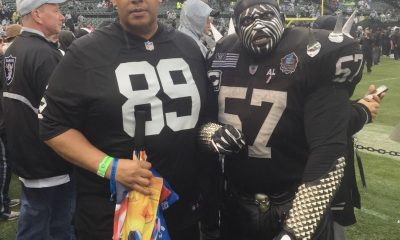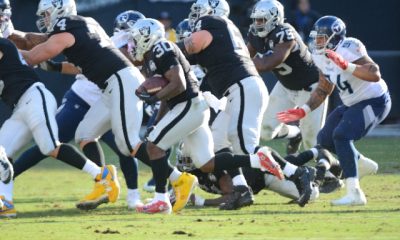Featured
Raiders Fall Late in The Fourth Quarter
Oakland, CA – The Raiders looked their best in almost three years. But the final seconds of the game mirrored the past two years. Philip Rivers moved his offense downfield to set up Branden Oliver’s one-yard touchdown with less than two minutes in regulation. Oakland got the ball back, Derek Carr went deep and was picked off by rookie Jason Verrett.
< p>
The Raiders lost a tough one when they fell to the Chargers 31-28. Carr’s pass was intended for Brice Butler who was covered tightly, but it was shot they thought could get. Unfortunately, trailing by three with 1:20 left in the game, Carr’s pass was intercepted and San Diego ran the clock out to end the game.
“Just trying to go one-on-one on that play,” Carr said. “Going into it, they played quarters right there to that side, if I’m not mistaken. Brice had a double move, so we knew he would have a one-on-one so, I pumped it, the safety was not in play, I wasn’t worried about the safety so I was just giving Brice a chance there.”
“It was a scenario where the coverage dictated where the ball was going to go and we took the shot,” said Raiders interim head coach Tony Sparano. “The kid made a heck of a play as you can see. We’re talking about an inch one way or an inch the other way and that’s the nature of the game.”
It was no better way to start the game than with with a 77-yard touchdown pass from Carr to Andre Holmes on opening drive. That play was the longest touchdown pass in Oakland’s history since Russell-Miller in 1986 on October 18, 2009. The Chargers responded quickly tying the game 7-7, Rivers found Eddie Royal for a 29-yard touchdown.
Oakland’s defense failed to stop San Diego on multiple plays despite a good effort. Rivers was sacked once and Carr was sacked none. The Chargers answered every time the Raiders scored. It was definitely an entertaining game to say the least. Rivers threw three touchdown passes and orchestrated the winning drive to seal San Diego’s victory. He went 22-for-34 throwing a total of 313 yards.
Carr accomplished something his older brother David never did and that’s throw four touchdown passes in one game. He tied the game in the second quarter, Carr connected with James Jones for the 6-yard touchdown. Maybe the burial of the football last week, the loss in London, the bye week and a new head coach were all motivational factors for this team to turn things around.
“It’s very frustrating when you play a team like that,” LB Sio Moore said. “If anybody watched that game, you know we had that game won. They’re not better than us period. We have to close games out when it gets to that point, it doesn’t matter where the ball is. Come fourth quarter it’s not a situation where it should be that crucial and if it is we know what to do.”
“It didn’t work out the way we wanted it to today,” said DE Justin Tuck. “But you always want to have the opportunity to stop an offense and preserve a win. Obviously, we’re not in the game for moral victories. We’re proud of the effort we had and things like that, but we’ve got to find a way to get off the field or at least hold them to a field goal or something.”
Sebastian Janikowski attempted a 53-yard field goal in the final minutes of the half but missed wide left. The Chargers came out of the half strong, Rivers threw a few bullets to move his offense down field but the Raiders defense held them. Nick Novak’s 54-yard field goal attempt was negated by a penalty and Oakland scored on Carr’s third touchdown, a 47-yard touchdown pass to Butler to extend their lead 21-14.
This is the first time the Raiders lead in the third quarter since Thanksgiving of last year. Carr finished the day going 18-for-34 for 282 yards. Rivers who was just as good if not better, connected with Malcolm Floyd for a 44-yard pass to setup a 2-yard touchdown pass to Antonio Gates tying the game 21-21. Oakland responded with a 6-yard touchdown pass in the fourth and lead 28-21 with 10 minutes left in the game.
“That’s the best team in the league according to most of you,” Sparano said. “I have all the confidence in the world they’ll play hard next week. We need to win these kind of football games. That’s how we turn this thing around.”
Activism
Oakland Post: Week of April 17 – 23, 2024
The printed Weekly Edition of the Oakland Post: Week of April 17 – 23, 2024

To enlarge your view of this issue, use the slider, magnifying glass icon or full page icon in the lower right corner of the browser window. ![]()
Activism
Oakland Schools Honor Fred Korematsu Day of Civil Liberties
Every Jan. 30, OUSD commemorates the legacy of Fred Korematsu, an Oakland native, a Castlemont High School graduate, and a national symbol of resistance, resilience, and justice. His defiant stand against racial injustice and his unwavering commitment to civil rights continue to inspire the local community and the nation. Tuesday was “Fred Korematsu Day of Civil Liberties and the Constitution” in the state of California and a growing number of states across the country.

By Post Staff
Every Jan. 30, OUSD commemorates the legacy of Fred Korematsu, an Oakland native, a Castlemont High School graduate, and a national symbol of resistance, resilience, and justice.
His defiant stand against racial injustice and his unwavering commitment to civil rights continue to inspire the local community and the nation. Tuesday was “Fred Korematsu Day of Civil Liberties and the Constitution” in the state of California and a growing number of states across the country.
One OUSD school is named in his honor: Fred T. Korematsu Discovery Academy (KDA) elementary in East Oakland.
Several years ago, founding KDA Principal Charles Wilson, in a video interview with anti-hate organization “Not In Our Town,” said, “We chose the name Fred Korematsu because we really felt like the attributes that he showed in his work are things that the children need to learn … that common people can stand up and make differences in a large number of people’s lives.”
Fred Korematsu was born in Oakland on Jan. 30, 1919. His parents ran a floral nursery business, and his upbringing in Oakland shaped his worldview. His belief in the importance of standing up for your rights and the rights of others, regardless of race or background, was the foundation for his activism against racial prejudice and for the rights of Japanese Americans during World War II.
At the start of the war, Korematsu was turned away from enlisting in the National Guard and the Coast Guard because of his race. He trained as a welder, working at the docks in Oakland, but was fired after the bombing of Pearl Harbor in 1941. Fear and prejudice led to federal Executive Order 9066, which forced more than 120,000 Japanese Americans out of their homes and neighborhoods and into remote internment camps.
The 23-year-old Korematsu resisted the order. He underwent cosmetic surgery and assumed a false identity, choosing freedom over unjust imprisonment. His later arrest and conviction sparked a legal battle that would challenge the foundation of civil liberties in America.
Korematsu’s fight culminated in the Supreme Court’s initial ruling against him in 1944. He spent years in a Utah internment camp with his family, followed by time living in Salt Lake City where he was dogged by racism.
In 1976, President Gerald Ford overturned Executive Order 9066. Seven years later, the 9th Circuit Court of Appeals in San Francisco vacated Korematsu’s conviction. He said in court, “I would like to see the government admit that they were wrong and do something about it so this will never happen again to any American citizen of any race, creed, or color.”
Korematsu’s dedication and determination established him as a national icon of civil rights and social justice. He advocated for justice with Rosa Parks. In 1998, President Bill Clinton gave him the Presidential Medal of Freedom saying, “In the long history of our country’s constant search for justice, some names of ordinary citizens stand for millions of souls … To that distinguished list, today we add the name of Fred Korematsu.”
After Sept. 11, 2001, Korematsu spoke out against hatred and discrimination, saying what happened to Japanese Americans should not happen to people of Middle Eastern descent.
Korematsu’s roots in Oakland and his education in OUSD are a source of great pride for the city, according to the school district. His most famous quote, which is on the Korematsu elementary school mural, is as relevant now as ever, “If you have the feeling that something is wrong, don’t be afraid to speak up.”
Community
For Cervical Cancer Month, Medical Community Focused on Education
January was Cervical Cancer Awareness Month. Physicians, advocates and others in the medical community commemorated the month by raising awareness about a form of cancer they say is highly preventable and treatable. Cervical cancer is caused by a virus called the human papillomavirus (HPV) and it develops slowly over time but can be prevented with proper care in girls as young as 13 years old.

By Magaly Muñoz
January was Cervical Cancer Awareness Month.
Physicians, advocates and others in the medical community commemorated the month by raising awareness about a form of cancer they say is highly preventable and treatable.
Cervical cancer is caused by a virus called the human papillomavirus (HPV) and it develops slowly over time but can be prevented with proper care in girls as young as 13 years old.
Sonia Ordonez, an OBGYN and gynecology surgeon at Kaiser Permanente, stated that as soon as people with cervixes reach the maturity reproductive age, they should start taking preventative measures like getting the HPV vaccine. The vaccine involves a series of two-doses for people aged 9 through 14 or three-doses for people 15 through 45 years old.
“I see a lot of young women who can’t remember or may not have gotten [the vaccine] when they were younger, or maybe got one, but we can give them the series of vaccines and restart at any point in time,” Ordonez said.
She said that cervical cancer is not the only cancer caused by HPV. Strains of the virus can also lead to throat, anal and penile cancers.
Screening is also an effective way to check for cervical cancer and should be done every three years after someone turns 21, doctors recommend. It is best to start as early as possible to catch occurrences early.
Ordonez said that this cancer is also more likely found in people of color and has led to more deaths overall.
A Mayo Clinic article published last month stated that Black women are more likely to be diagnosed and die of cervical cancer, compared to White women in the U.S.
2,000 Black women are diagnosed every year with cervical cancer and 40% die as a result.
“This disparity is not due to genetic differences among White, Black or Hispanic women, but rather related to systemic racism, access to healthcare and socioeconomic factors,” Dr. Olivia Cardenas-Trowers, a Mayo Clinic urogynecologist, said in the article.
Ordonez stated that immigrant women are also highly susceptible to the cancer, as many Latin American countries may not have accessibility to screenings or lack of insurance makes it harder for them to get tested.
Hispanic women are 40% more likely to be diagnosed with cervical cancer, and 30% more likely to die from it, as compared to non-Hispanic White women, according to the Office of Minority Health.
Family medicine physician, Joy Anyanwu, stated that the pandemic contributed to hesitancy about getting cervical cancer screenings among some women. Other factors are people’s aversion to vaccines, parents not wanting to believe that their children are or will become sexually active, and doubt about the overall effectiveness of the vaccine.
“The vaccine is very safe — over 97% effective in preventing cervical cancer,” Anyanwu said. “Even if you aren’t having sex, the earlier you start would actually help.”
Anyanwu said she understands that parents might not want to ask questions about their children’s reproductive health, but it’s a mindset that can be a barrier to having important conversation about prevention or care.
To keep families their families and communties healthy, the doctor emphasized that people should prioritize keeping up with their vaccine series and going to screenings every year.
-

 Activism4 weeks ago
Activism4 weeks agoOakland Post: Week of March 20 – 26, 2024
-

 #NNPA BlackPress3 weeks ago
#NNPA BlackPress3 weeks agoCOMMENTARY: D.C. Crime Bill Fails to Address Root Causes of Violence and Incarceration
-

 #NNPA BlackPress4 weeks ago
#NNPA BlackPress4 weeks agoFrom Raids to Revelations: The Dark Turn in Sean ‘Diddy’ Combs’ Saga
-

 #NNPA BlackPress3 weeks ago
#NNPA BlackPress3 weeks agoMayor, City Council President React to May 31 Closing of Birmingham-Southern College
-

 #NNPA BlackPress4 weeks ago
#NNPA BlackPress4 weeks agoCOMMENTARY: Lady Day and The Lights!
-

 Activism3 weeks ago
Activism3 weeks agoOakland Post: Week of March 27 – April 2, 2024
-

 #NNPA BlackPress4 weeks ago
#NNPA BlackPress4 weeks agoBaltimore Key Bridge Catastrophe: A City’s Heartbreak and a Nation’s Alarm
-

 #NNPA BlackPress4 weeks ago
#NNPA BlackPress4 weeks agoBaltimore’s Key Bridge Struck by Ship, Collapses into Water

















































